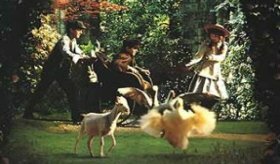|
|
| Tookey's Review |
|
| Pro Reviews |
|
| Mixed Reviews |
|
| Anti Reviews |
|
| Cast |
|
| |
 |
| |
| Released: |
1993 |
| |
|
| Genre: |
DRAMA
REMAKE
FAMILY
|
| |
|
| Origin: |
US |
| |
|
| Colour: |
C |
| |
|
| Length: |
101 |
|
| |
|
| |
|
|
| |
|
|
A spoiled, selfish young girl, Mary Lennox (Kate Maberly) is orphaned and goes to live in a vast, loveless house on the Yorkshire moors. Here she survives the cold - both physical and emotional.
|
Reviewed by Chris Tookey
|
|
This book is a natural for the cinema, since its metaphors are so visual: winter turns into spring as the characters’ emotions thaw; the dormant garden is a symbol of the children’s better nature. No wonder, then, that Hollywood had already filmed the story: the 1949 black and white film simplified and Americanised the characters for the screen, but was memorable for the way it burgeoned into colour for the garden sequences, And there was a lavishly produced, though indifferently acted, BBC production in 1987. But it took a Polish director, an American executive producer (Francis Ford Coppola) and an almost entirely British cast and crew, led by cinematographer Roger Deakins and designer Stuart Craig, to put together this version - and it’s a beauty.
I have minor niggles. The continuity is dismayingly amateurish early on - the dirt on Mary Lennox’s face rarely stays in one place for two consecutive shots. The director makes too little use of the coldness of the interiors (they are lit, instead, with a kind of autumnal glow which gives them the aura of advertisements for English Heritage). I could certainly have done without the heavenly chorus which swells whenever a plant comes into focus; and the climax is prolonged to the point of irritation. Nevertheless, the American screenwriter Caroline Thompson wrote a magical screenplay for Edward Scissorhands, and she’s pulled off the same trick again. She has even spotted some largely unnoticed undertones of the original: the quasi-sexual relationship between Mary and Dickon, the extent to which the three children’s relationship is an emotional triangle in the making.
Interestingly for a woman screenwriter, she has banished the one benevolent mother-figure of the novel (Mrs Sowerby, mother of Martha the maid) and focused totally on the relationship - or lack of it - between Colin and his father. In doing so, it must be admitted, Thompson is following every cinematic precedent of the Nineties. Fatherhood, or the absence of fathers, seems to be the burning cinematic topic of that decade.
A few other elements of the novel have been lost. In the original, Mary Lennox’s parents die of cholera. The film replaces this with that more cinematic instrument of death, an earthquake. This weakens one of the underlying themes of the novel: fear of contamination. In the film, the servants’ wearing of surgical masks when visiting the invalid Colin is laughable: in the book, there is more sense that they may have a point, that Mary Lennox may be meddling in things she doesn’t understand.
Another dimension which has been mislaid is one of adult malice: one reason that Colin is treated so poorly in the novel is his doctor’s desire that the boy be an invalid. It’s no accident that the doctor is Colin’s uncle, and stands to inherit the estate if Colin dies.
But these are relatively minor quibbles - and perhaps one should be grateful that so much of the story and spirit of the novel remain intact, and at a length which children will find tolerable.
Stalwartly refusing to be upstaged by children, animals or time-lapse photography, Maggie Smith is predictably wonderful as Mrs Medlock, the Yorkshire housekeeper, normally played (as in the 1949 film by Gladys Cooper) as a forbidding old woman who would have intimidated Rebecca 's Mrs Danvers. Maggie Smith offers a much richer, more comic interpretation: here is a woman who is fundamentally well-meaning but medically naive, insensitive, fearful for her job, and a stickler for Victorian ideas of discipline. She is, in her way, endearingly eccentric - and there’s a lovely moment towards the end when Martha the maid consoles her, in the movie’s one concession to a mother-daughter relationship.
John Lynch, as Colin’s absentee father, has little in the way of dialogue, and Ms Holland sensibly takes the opportunity to portray him in more visual terms, as a saturnine, moody mixture of Heathcliff and Dracula, surrounded by snarling mastiffs or, like Bram Stoker’s anti-hero, being transported across bleak moorland in a black carriage.
But it’s the children you remember. The director has wisely resisted all Hollywood temptation to sweeten them, so their journey from brattishness to openness is all the more realistic and unaffected - and, as a consequence, very affecting. Anyone of any age should enjoy this lovely, lively, often enchanting film - and it’s such an effective weepie that it will make even the most hard-hearted of us wish we had shares in Kleenex.
|
|
|
|
|
